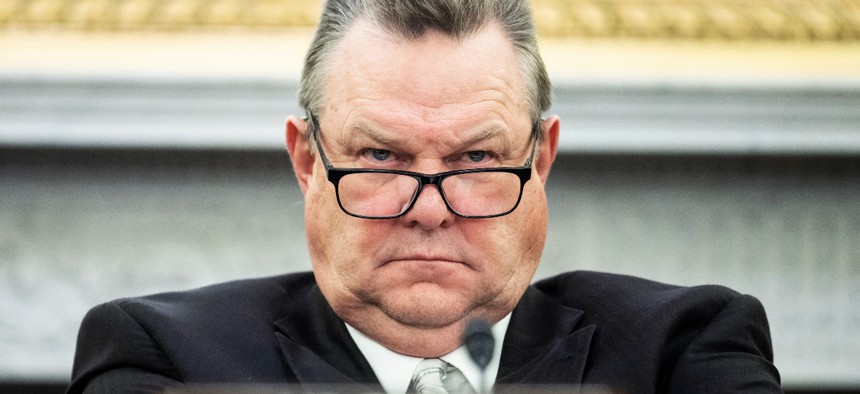Veteran Deaths Lead Lawmakers to Call for VA to Renegotiate Oracle EHR Contract

Chairman Jon Tester, D-Mont., listens to testimony by Joshua D. Jacobs, nominee to be Under Secretary for Benefits of the Department of Veterans Affairs, during the Senate Veterans' Affairs Committee confirmation hearing in Russell Building, February 16, 2023. Tom Williams / Contributor/Getty Images
Senate Veterans’ Affairs Committee Chairman Jon Tester said that VA should “negotiate an entirely new contract” with Oracle Cerner following the revelation that the EHR system has resulted in the deaths of four veterans.
Leading lawmakers on the Senate Veterans’ Affairs Committee threatened to crack down on Oracle Cerner’s management of the VA’s new multi-billion dollar electronic health record system during a hearing on Wednesday after department officials informed lawmakers this week that the software was a factor in the deaths of several veterans.
The hearing came after VA officials informed Congress on Tuesday that the Oracle Cerner EHR system was found to have “fatally harmed” several veterans, resulting in renewed concerns from the committee’s lawmakers about patient safety outcomes resulting from the software’s deployment.
“My staff were told yesterday that there were six catastrophic events related to a feature of the electronic health record modernization program in the last couple of years,” Sen. Richard Blumenthal, D-Conn., said during the hearing, adding that “four of the events resulted in a fatality.”
Cerner—which was purchased by Oracle in June 2022—won a $10 billion contract in 2018 to modernize VA’s EHR system. Since that time, the department’s rollout of the new software has been plagued by outages, patient safety issues, training difficulties and cost overruns. A report released in July 2022 by the VA's Office of Inspector General found that, after the system was first deployed at the Mann-Grandstaff VA Medical Center in Spokane, Washington in October 2020, more than 11,000 orders for clinical services were inadvertently routed to “unknown queue” without alerting clinicians, which resulted in “multiple events of patient harm.”
VA announced last October that it was pausing future rollouts of the new EHR system at VA medical facilities until June 2023 to give the agency time to “fully assess performance and address every concern” with the system’s deployment. VA representatives and an Oracle executive used Wednesday’s hearing to outline some of the technical and performance improvements that have been made ahead of the still-planned resumption in June.
Mike Sicilia, executive vice president for industries at Oracle, said the company has worked to remedy issues surrounding the unknown queue, telling the committee that the number of orders directed to the queue have dropped to roughly one a day. And Neil Evans, who took over as the acting head of VA’s Electronic Health Modernization Program three weeks ago, said that “VA is working aggressively to address issues with the configuration and performance of the new system based on direct feedback from end users.”
“Though there is still a lot of work to do, important progress is being made,” Evans said, citing, in part, an update to the system last month that included three critical pharmacy enhancements.
Despite ongoing improvements to the EHR system, however, lawmakers continued to express concerns about the viability of the new software without stronger guardrails in place to ensure the safety of veterans moving forward.
Sen. Jerry Moran, R-Kan., the panel’s ranking member, said that continuing patient safety issues and poor program management “suggest to me that the whole effort may be sleepwalking toward an extremely destructive result.”
“The five medical centers that are using this system are struggling with delays, disruptions and rising costs, and only yesterday we find out the system has been a factor in the loss of veterans’ lives,” Moran added.
Patty Murray, D-Wash., who serves on the committee and also chairs the powerful Senate Appropriations Committee, called the continuing safety risks to patients “totally unacceptable,” adding that “I do not believe that more money is what is going to solve this problem.”
“And I’m not sure it makes sense … to continue to fully fund the budget request for this system until I can see that the system is working and not putting our veterans in harm's way,” Murray added. “That responsibility is on both the VA and Oracle Cerner, and both entities need to step up.”
In response to Murray’s remarks, committee Chair Jon Tester, D-Mont., told the panel’s witnesses that “I’ll tell you, in short, our patience is running thin.”
But Tester stopped short of calling for the program to be terminated—something that has been proposed by several House Republicans—saying that “all options but one are on the table to fix this new EHR: I'm not going to abandon the effort to modernize VA's records.”
Renegotiate Oracle Cerner contract, Tester tells VA
Noting that VA’s current contract with Oracle Cerner is set to expire May 16, Tester called for VA Secretary Denis McDonough to “bring together government and industry best contract experts and renegotiate the Oracle Cerner contract.”
Tester cited the fact that Oracle Cerner has only refunded the government roughly $325,000 of the $4.4 billion it has been paid through the contract for software deployment issues, and said that “severe penalties for poor performance” need to be incorporated into any renegotiated agreement. If Oracle Cerner won’t agree to those terms, Tester said, then VA should prepare “to negotiate an entirely new contract, or find a different team of partners.”
Michael Parrish, VA’s chief acquisition officer, told the committee that VA has already begun renegotiating the soon-to-expire contract, and is working to improve the contract’s terms so that it includes stronger performance enforcement mechanisms.
“Do you anticipate this next contract will be more favorable to the American taxpayer?” Tester asked him.
“That’s absolutely the plan,” Parrish responded.






